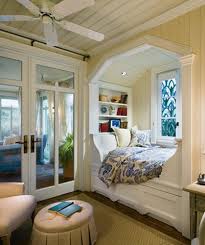
记忆方法
alcove凹口屋.屋子里的凹口 n. 凹室(凹进处,与一个房间相连或形成房间的一部分)。
2. al 音:凹 + cave 洞穴→凹洞;音:凹坑屋,凹进去的坑做成的屋子
3. 谐音“爱抠窝、爱抠屋”。
2. al 音:凹 + cave 洞穴→凹洞;音:凹坑屋,凹进去的坑做成的屋子
3. 谐音“爱抠窝、爱抠屋”。
中文词源
alcove 壁凹
来自阿拉伯语al-qobbah. al, 阿拉伯定冠词。qobbah,拱顶,拼写受cave影响而俗化。
英语词源
- alcove
-
alcove: [17] Alcove is of Arabic origin. It reached English, via French alcôve and Spanish alcoba (where it means ‘recessed area for a bed’), from Arabic al-qobbah ‘the arch, the vault’, hence ‘the vaulted room’, which was derived from the verb qubba ‘vault’.
- alcove (n.)
- 1670s, "vaulted recess," from French alcôve (17c.), from Spanish alcoba, from Arabic al-qobbah "the vaulted chamber," from Semitic base q-b-b "to be bent, crooked, vaulted."
权威例句
- 1. The bookcase fits neatly into the alcove.
- 书架正好放得进壁凹。
- 2. The alcove held a couch.
- 这凹进去的地方有一张长沙发.
- 3. Set into an alcove under the side deck is a tiny wash basin.
- 舷边甲板下面的一个凹处放了一个小小的洗脸盆。
- 4. The bed fits neatly into the alcove.
- 床正好放进壁凹里.
- 5. A young lady, a guest of the house, playing a piano in an alcove pleased him.
- 一位年轻太太, 这家饭店的一个客人, 正在一间凹室里弹钢琴,使他感到很愉快.
